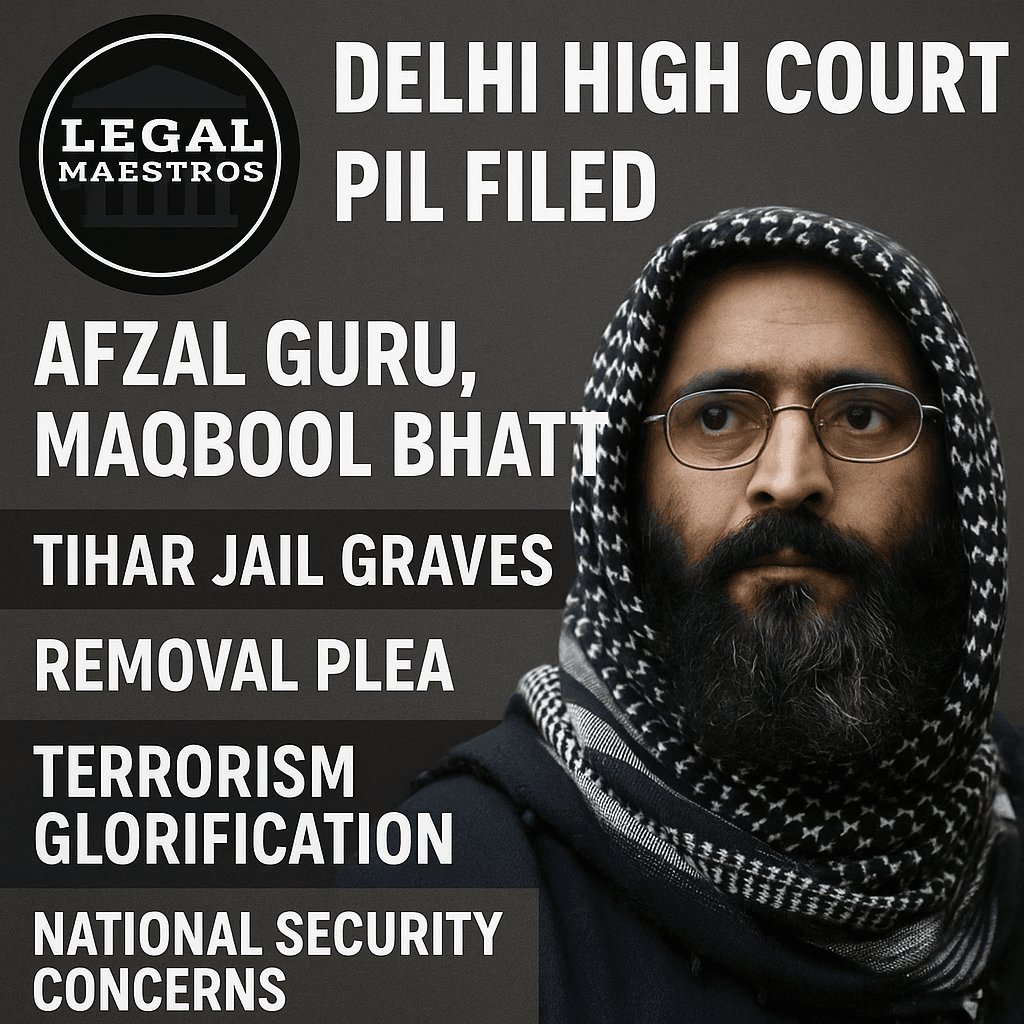
Delhi High Court PIL Seeks Removal of Afzal Guru, Maqbool Bhatt Graves from Tihar Jail to Curb Terrorism Glorification
A Controversial Plea in Delhi High Court
It is an important Public Interest Litigation (PIL) which was applied to the Delhi High Court, and in which a long-standing and sensitive matter has entered the legal discourse. The petitioner in the case is demanding that the court issue an order to have the graves of two convicted terrorists, Afzal Guru and Maqbool Bhatt, taken out of the territory of Tihar Jail in the national capital. This is a legal action that tries to pursue the fact that there is a possibility of promoting terrorism.
A former employee of Research and Analysis Wing (RAW) which is the external intelligence agency in India filed the PIL. The main reason of the plea is that this burial ground in one of the complexes of prisons controlled by the state might serve as an idea-giver to the anti-national factors and secessionists. The petitioner argues that their continued stay is an insult to the national sovereignty of the country and to the memory of the many victims of terrorism.
As a reaction to the seriousness of the concerns brought up, the court of Delhi has already made the first move of sending notices to the central government and the Delhi government. This demands that the authorities produce and deliver their official position on the issue. The inclusion of the court reflects an essential stage of the matter of the future of these controversial graves and the principles of law regarding them.
For any queries or to publish an article or post or advertisement on our platform, do call at +91 6377460764 or email us at contact@legalmaestros.com.
The case has rejuvenated a complicated discourse that cuts across legal processes, security issues in the United States, and politics. The court will then look into the case advanced by both the petitioner and the government and then make a decision. The result of this PIL will be observed keenly because it has an implication of how the state treats the remains of the people found guilty of heinous crimes against the nation.
Who Were Afzal Guru and Maqbool Bhatt?
In order to comprehend the background of the PIL, one must know what was Afzal Guru and Maqbool Bhatt. Afzal Guru was also found guilty of having been involved in the deadly attack on the Indian Parliament that took place in 2001 a daring attack on the very heart of Indian democracy. He was discovered to have been a terrorist with the Jaish-e-Mohammed organization and executed due to his offences on February 9, 2013, after an extended judicial procedure.
One of the most famous Kashmiri separatist leaders and a co-founder of Jammu Kashmir Liberation Front (JKLF), a militant separatist organization, was Maqbool Bhatt. He was sentenced to the murder of an Indian intelligence officer in the 1960s.
For any queries or to publish an article or post or advertisement on our platform, do call at +91 6377460764 or email us at contact@legalmaestros.com.
The interring of these two personalities in the jail has remained a debatable matter since then. Though the justification of the government was based on the fact that they need to uphold the order of the people, it has resulted into the continued insistence of their families and separatist movements in recovering their mortal remains. This history lies at the core of the legal dilemma that is seeking the dislodging of their graves.
Arguments Against the Jail Burials
The main point that the petitioner makes is that the graves of Afzal Guru and Maqbool Bhatt within Tihar Jail have inadvertently turned into shrines that honors terrorism. The PIL claims that secessionist groups and their supporters consider these locations as martyrdom sites especially in Kashmir. This, in its turn, is employed as a radicalizing instrument of inspiring a new generation of young people to pick up arms against the state.
The plea also argues that the presence of the graves of convicted terrorists on government land is against the public policy and it is not favorable to the war on terrorism in the country. It is perceived as the symbolic contradiction in which the state, who struggled to bring these people to the justice, is now seen as the upholder of their legacy. This sends a divided message to the citizens particularly to the families of the soldiers and civilians who have died in terrorist attacks.
For any queries or to publish an article or post or advertisement on our platform, do call at +91 6377460764 or email us at contact@legalmaestros.com.
The petition suggests that even the existence of these burial sites constitutes an affront to the memory of the security personnel who died during the defence of the Parliament in 2001 and that of other victims of terrorism which are associated with these people. According to the petitioner, their continued existence is a daily painful reminder to these families and undermines the ability of people to trust the state in its commitment in fighting terror more than ever.
The PIL underlines the fact that the graves should be removed to restore the national dignity and honor. It is placed as one that would send a message that was potent and unmistakable that the Indian state in no manner condones or commemorates those who have waged war against it. The lawsuit aims at making amends to what the petitioner considers as a historical injustice that carries repercussions in terms of security and emotion.
The Legal and Political Context
The legal instrument on which this issue is brought to court is a Public Interest Litigation, or PIL. A PIL enables any citizen to go to the court in an issue of national concern especially where the person cannot represent themselves. Here, it is being applied to solve a national security and a sentiment paper claiming that the existence of the graves is detrimental to the interest of the masses.
For any queries or to publish an article or post or advertisement on our platform, do call at +91 6377460764 or email us at contact@legalmaestros.com.
There is a complicated legal system that deals with the exhumed bodies of the executed inmates, especially during terrorism. Prison manuals and national security protocols have been used by the government in the past to explain why the government did not give the families the bodies. The main issue has always been the possibility of mass populism and the establishment of martyrs, which would contribute to the escalation of the conflict.



![JOB POST: Junior Associate at ASM Law Chambers, Jaipur [Freshers]](https://legalmaestros.com/wp-content/uploads/2025/11/Gemini_Generated_Image_8wrxer8wrxer8wrx-768x708.png)

